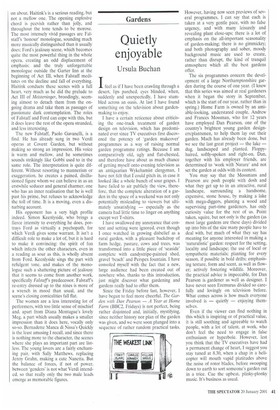Quietly enjoyable
Ursula Buchan
Ifeel as if I have been crawling through a desert, lips parched, eyes blinded, when, suddenly and unexpectedly, I have stumbled across an oasis. At last I have found something on the television about gardenmaking to enjoy.
I have a certain reticence about criticising the one-track treatment of garden design on television, which has predominated ever since TV executives first discovered the potency of 'garden makeover' programmes as a way of raising normal garden programme ratings. Because I am comparatively old, ugly and flat-chested, and therefore have about as much chance of getting myself onto evening television as an antiquarian Wykehamist clergyman, I have not felt that I could pitch in, in case it looked like a whole bunch of sour grapes. I have failed to air publicly the view, therefore, that the complete alteration of a garden in the space of a weekend was not only potentially misleading to viewers but ultimately unsatisfying — especially as the camera had little time to linger on anything except wet T-shirts.
I have swallowed my annoyance that context and setting were ignored, even though I once watched in growing disbelief as a rural garden, with a pleasant backdrop of farm hedge, pasture, cows and trees, was transformed into a little piece of 'seaside' complete with candystripe-painted shed, gravel 'beach' and Perspex fountain. I have consoled myself with the fact that a new, large audience had been created out of nowhere who, thanks to this introduction, just might discover what gardening and gardens really had to offer them.
Since the Friday before last, however, I have begun to feel more cheerful. The Garden with Dan Pearson — A Year at Horne Farm (BBC2, Fridays) is not perfect, being rather disjointed and, initially, mystifying, since neither history nor plan of the garden was given, and we were soon plunged into a sequence of rather random practical tasks. However, having now seen previews of several programmes, I can say that each is taken at a very gentle pace, with no false urgency, and with many leisurely and revealing plant close-ups; there is a lot of emphasis on the all-important seasonality of garden-making; there is no gimmickry; and both photography and sober, moody background music are used to create, rather than disrupt, the kind of tranquil atmosphere which all the best gardens offer.
The six programmes concern the development of a large Northamptonshire garden during the course of one year. (I knew that this series was aimed at real gardeners when it began the story in September, which is the start of our year, rather than in spring.) Home Farm is owned by an amiable-looking, understated couple, Andrew and Frances Mossman, who for 12 years have employed Dan Pearson, one of the country's brightest young garden designers/plantsmen, to help them lay out their garden. Much has already been done, but we see the last great project — the lake — dug, landscaped and planted. Floppyhaired, softly-spoken and right-on, Dan, together with his employer friends, are determined to 'work with Nature' and not set the garden at odds with its context.
You may say that the Mossmans and Pearson are posh people with dosh and what they get up to in an attractive, rural landscape, surrounding a handsome, expensive, stone house, by making a lake with mega-diggers, planting a wood and supervising part-time gardeners, has only curiosity value for the rest of us. Point taken, squire, but not only is the garden (as most large gardens are these days) divided up into bits of the size many people have to deal with, but much of what they say has meaning for anyone interested in making a 'naturalistic' garden: respect for the setting, locality and landscape; the use of local or sympathetic materials; planting for every season, if possible in bold drifts; emphasising texture, form and scent, as well as flower; actively fostering wildlife. Moreover, the practical advice is impeccable, for Dan Pearson is gardener as well as designer. I have never seen Fremunis divided so carefully and lovingly on television before. What comes across is how much everyone involved is — quietly — enjoying themselves.
Even if the viewer can find nothing in this which is inspiring or of practical value, it is still soothing and agreeable to watch people, with a lot of talent, at work, who don't feel the need to engage in false enthusiasm or hyperbole. However, lest you think that the TV executives have had a permanent change of heart, I suggest you stay tuned at 8.30, when a chap in a helicopter will mouth vapid platitudes above the noise of rotor blades, before swooping down to earth to sort someone's garden out in a trice. Cue the upbeat, plinlcy-plonky music. It's business as usual.






























































 Previous page
Previous page